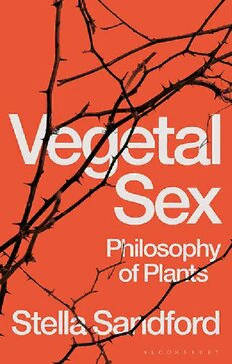
Vegetal Sex: Philosophy of Plants PDF
257 Pages·2023·3.229 MB·English
Most books are stored in the elastic cloud where traffic is expensive. For this reason, we have a limit on daily download.
Preview Vegetal Sex: Philosophy of Plants
Description:
In recent years philosophers, botanists and mycologists have drawn our attention to the complexities of plant and fungal life. They have taught us why plants are better thought as colonies than individuals and how animal-centred ways of thinking fail to capture what is peculiar and perhaps admirable in vegetal life. They have taught us to appreciate the temporality and intricacy of vegetal existence and suggested how relations between plants might provide us with non-individualistic models of coexistence. But they have not, as yet, taught us much – if anything – about vegetal sex.This book introduces the reader to the exciting new field of plant philosophy and takes it in a new direction to ask: what does it mean to say that plants are sexed? Do ‘male’ and ‘female’ really mean the same when applied to humans, trees, mushrooms and algae? Are the zoological categories of sex really adequate for understanding the – uniquely ‘dibiontic’ – life cycle of plants?Vegetal Sex addresses these questions through a detailed analysis of major moments in the history of plant sex, from Aristotle to the modern day. Tracing the transformations in the analogy between animals and plants that characterise this history, it shows how the analogy still functions in contemporary botany and asks: what would a non-zoocentric, plant-centred philosophy of vegetal sex be like?By showing how philosophy and botany have been and still are inextricably entwined Vegetal Sex allows us to think vegetal being and, perhaps, to recognise the vegetal in us all.
See more
The list of books you might like
Most books are stored in the elastic cloud where traffic is expensive. For this reason, we have a limit on daily download.
